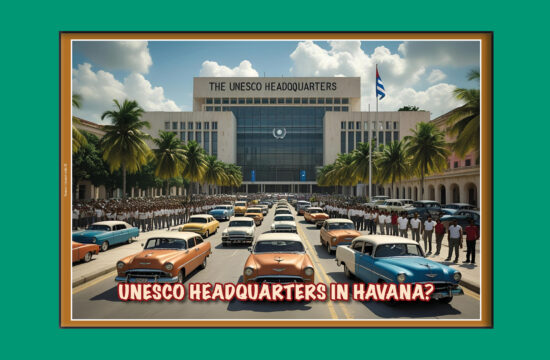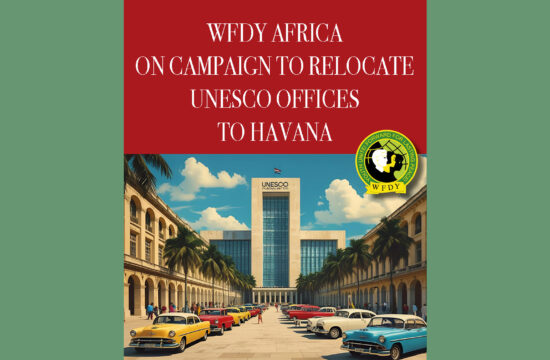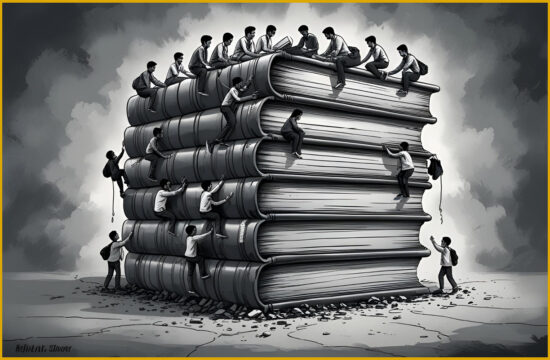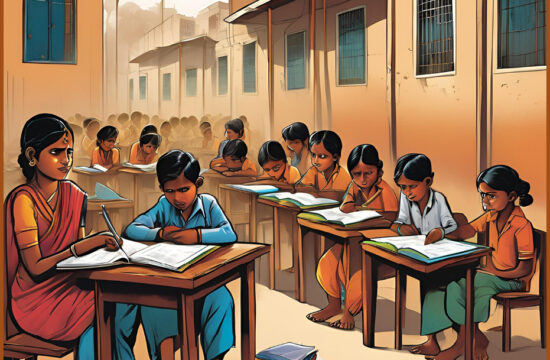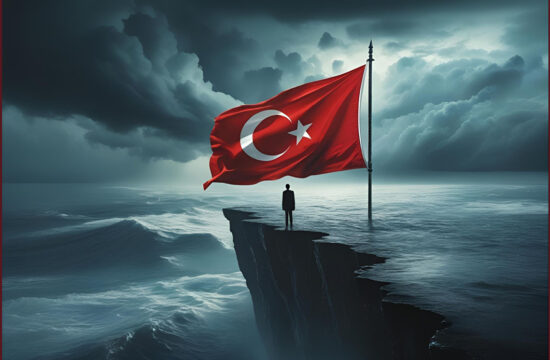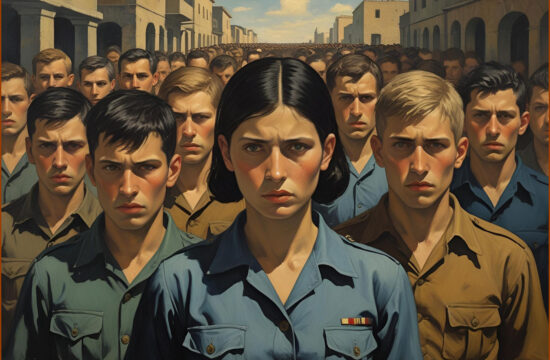FATİH YAŞLI
AUTHOR – TÜRKİYE
picture: Created with AI
Türkiye woke up on the morning of March 19, 2025, to one of the biggest political operations in its history. Ekrem İmamoğlu, the Mayor of Istanbul, the largest city of Türkiye, and the presidential candidate of the Republican People’s Party (CHP), the leading party in the last local elections, was detained along with a large number of municipal bureaucrats on charges of “corruption and terrorism,” and most of them, including İmamoğlu, were arrested. Just one day before this operation, İmamoğlu’s university diploma, which he had received thirty-one years ago, was revoked on the grounds of irregularities. Given that a university degree is required to run for the presidency, it was clear that this was also a political maneuver.
What was the background to this process, which, according to almost all polls, the vast majority of society considered to be political rather than judicial? Why was the diploma of İmamoğlu, who is currently in prison, revoked, and why was he arrested on charges of corruption and terrorism?
To find the answer to this question, we first need to go a little further back than March 19, 2025, to the local elections held on March 31, 2024. That election represented a real turning point in Türkiye’s recent history. At the March 31 local elections, the Islamist populist Justice and Development Party (AKP), which had been in power since the November 3, 2002 elections, suffered its first defeat, while the CHP, which carries the banner of social democracy unique to Türkiye, managed to become the leading party for the first time since 1977. Furthermore, while the CHP managed to retain many of the municipalities it won in 2019, it also won mayoral elections for the first time in some cities known as strongholds of the AKP and the Turkish right in general.
The AKP officially recognized the election results, but shortly thereafter launched a series of operations aimed at neutralizing and taking over CHP-run municipalities. Therefore, the CHP faced a similar situation in 2025 to the process that began in 2024, whereby mayors affiliated with the DEM Party, which is linked to the PKK, were removed from office and replaced by state officials known as “trustees.” At the time of writing of this article, fifteen CHP mayors, three of whom were from metropolitan cities and twelve from districts, were in prison, along with hundreds of municipal bureaucrats, and despite the fact that five months had passed since their arrest, no indictment had yet been prepared against them and they had not been brought before a judge.
What is de-electionalization?
I refer to this process currently unfolding in Türkiye as “de-electionization,” borrowing the term “de-constitutionalization” from constitutional lawyers, and I believe that this concept provides us with important clues for understanding what is happening. De-constitutionalization is a term used to describe a situation in which the constitution has not been formally abolished but has been effectively suspended by those in power, fundamental rights and freedoms guaranteed by the constitution cannot be exercised by society, and constitutional court decisions are not complied with. I use the term “de-electionization” to describe a situation in which elections are not officially abolished but become a mere formality, those in power eliminate their opponents through various methods, primarily repressive policies, render the opposition ineffective, and engage in various manipulations to turn the results of the ballot box to their advantage.
Although the term belongs to me, my starting point here is Federico Finchelstein’s book “The Wannabe Fascists,” known for his work on right-wing populism and fascism. In his book, Finchelstein argues that figures such as Trump, Bolsonaro, and Modi are eager to build fascist regimes similar to those of the 1930s, but that both the domestic and international contexts do not allow for this. Instances such as Trump’s supporters storming the US Congress after he lost the 2020 election, or Bolsonaro’s refusal to accept the election results in Brazil in 2022, which meant defeat for him, and his subsequent forced resignation from the presidency, demonstrate the connections between enthusiasm for fascism and elections. These leaders would not recognize the election results and might even abolish the electoral system as we know it, if the balance of power allowed it and the circumstances were right; however, they do not dare to do so at present, and their desires do not go beyond “aspiring to fascism.”
Thus, the events unfolding in Türkiye must be interpreted and evaluated in the context of the process of “de-electionization” that a government eager for fascism has brought the country into. Furthermore, I suggest that this process did not begin on March 19, 2025, but rather that its origins can be easily traced back to the AKP’s stance in previous elections; in order to do so, we need to go back even further to the 2014 local elections and recall the developments that took place between then and March 19.
The history of de-electionization
In the 2014 local elections, there was a fierce contest between Melih Gökçek, the AKP mayor of Ankara, and Mansur Yavaş, the CHP candidate. The counting of votes continued until morning, and reports of fraud and irregularities kept coming in from different polling stations, but with the intervention of Efkan Ala, the Minister of the Interior at the time, it was announced that Gökçek had won the election by a very small margin. Mansur Yavaş filed a complaint with the Supreme Election Board alleging “complete illegality” in the elections, but the board, which is controlled by the ruling party, rejected Yavaş’s objection and officially declared Gökçek the winner of the election. This was one of the most critical stages in the process of de-electionization in Türkiye, and it was here that the first signs of what the ruling party might do in the event of an election defeat became apparent.
Türkiye held general elections in 2015, although the AKP ran as the leading party, it failed to secure a majority sufficient to form a government on its own; a coalition was required to form a government. This was incompatible with the nature of the AKP, because the AKP was a party that sought to build a regime and establish a state, and it was impossible for it to implement its roadmap with a coalition government. Therefore, Türkiye has been put into a “re-election” scenario in a very short period of time. Davutoğlu, who was tasked by Erdoğan with forming a government, stalled the opposition during coalition talks and then returned the task to Erdoğan, who did not give it to the second largest party, the CHP, and said that the country would go to the polls again in a very short time. For the first time in the history of Türkiye, a government was refusing to recognize the election results and was preparing to hold new elections. At the same time as this decision was made, violence was reignited in the Kurdish conflict and clashes began, ISIS was brought into play by dark forces, and hundreds of opponents were killed in suicide bombings, first in Suruç, Urfa, and then in the capital Ankara. Meanwhile, the ruling party sought votes from the public with a security-oriented and nationalist rhetoric, aiming to regain sole power by using the events as a means of blackmail. When Türkiye went to the polls again on November 1, a total of 862 people had lost their lives in the short period between the June 7 elections and that day. This policy of violence and intimidation proved effective, and the AKP increased its vote share by approximately 9 points in the November 1 elections, regaining sole power. That meant the process of de-electionalization was shifting from local elections to general elections; for the first time in the country, a party was effectively refusing to recognize election results, forcing the country back to the polls, and winning the repeated elections by designing politics through violence.
Shortly after this election in Türkiye, there would be an attempted coup. The Gülen Movement, an unofficial partner of the AKP and a religious community that had been organizing within the state for a long time, especially within the military, would attempt to overthrow the AKP. After defeating the coup attempt on July 15, 2016, the AKP would form an alliance with the radical right-wing Nationalist Movement Party (MHP), and the MHP would soon announce its support for the AKP’s transition from a parliamentary system to a presidential system. Following the announcement of this support, Türkiye would hold a referendum on April 16, 2017, to amend the relevant articles of the constitution, with the result being 51 percent in favor and 49 percent against, allowing the ruling party to achieve its goal by a narrow margin. However, thousands of unstamped ballots were used in the election, and despite the clear provisions of the election law, the Supreme Election Board accepted the unstamped ballots as valid. When the results were announced, AKP supporters would fire shots into the air in the streets under the guise of election celebrations, while Erdoğan would implicitly acknowledge the fraud by saying „that train has left the station“. Even though the opposition declared that it would not recognize the election results and would do everything necessary to have the elections annulled, it did not dare to engage in a real struggle, and Türkiye was to transition from a parliamentary system to a presidential system through irregularities and fraud, in line with the process of eliminating elections.
Five years after the 2014 elections, local elections were held in Türkiye, and this time the target of the de-electionization process was Istanbul. Istanbul, Türkiye’s largest city, was extremely important for the AKP both politically and economically. Istanbul had been the stronghold of Islamism for years, and Islamism’s march to power had begun with the municipalities here. AKP’s leader, Erdoğan, also served as mayor of Istanbul for one term. In the elections held on March 31, 2019, CHP candidate Ekrem İmamoğlu pulled off a major upset by winning the election; however, the AKP would not easily accept this defeat, and the dynamics of electoral manipulation would come into play once again. After days of power struggles, the ruling party managed to cancel the Istanbul elections without any legal basis, and the certificate of election awarded to İmamoğlu was revoked, leading to a new election. When İmamoğlu won the June 23 elections by a large margin, there was nothing left for the ruling party to do, but it was very clear that when the balance of power allowed, the ruling party would not recognize the election results and could officially have them annulled.
Türkiye held general elections in 2023 and local elections in 2024. In the first round of the elections held on May 14, 2023, the AKP’s candidate, President Tayyip Erdoğan, managed to come out on top, receiving 4.5 percentage points more votes than his opponent and the joint candidate of the opposition, Kemal Kılıçdaroğlu; however, according to the electoral system, a second round was necessary as no candidate had secured more than 50% of the vote. In the second round, Erdoğan secured 52 percent of the total votes, successfully winning re-election as president. The AKP-MHP alliance also managed to secure a majority in the parliamentary elections, resulting in a strong government.
In the local elections to be held approximately one year later, on March 31, 2024, the situation would be completely reversed; the AKP suffered its first election defeat, while the CHP won an election victory for the first time in 47 years. The margin of victory in the provinces won by the CHP, particularly in the major cities, was so large that it was impossible to commit any irregularity or fraud in the counting of votes or their entry into the system; similarly, there was no basis for the ruling party to contest the results and demand a recount. The outcome of the March 31 elections showed that the ruling party continued to lose votes in major cities, and now rural towns were joining them. In some cities historically known as strongholds of the Turkish right, the CHP candidate had emerged victorious at the ballot box, and this clearly signaled a loss of hegemony for the AKP.
From March 31 to March 19, and then where?
The main reason for the AKP’s defeat in the March 31 elections was the deepening economic crisis. This crisis, which opposition economists call a “distribution crisis”, was further deepened by the economic program pursued by Mehmet Şimşek, who was appointed to the Treasury and Finance Ministry after the May 14-28 elections. This classic neoliberal program, known as the “Şimşek’s Program,” was based on the belief that demand must be reduced in order to lower inflation. To reduce demand, it was necessary to lower the purchasing power of the general public, that is, to impoverish them. The Şimşek program lowered real incomes while raising interest rates in order to reduce inflation. Therefore, for millions who sustain their lives with credit cards and consumer loans but can only survive by borrowing, finding credit has become more costly. On the other hand, in an inflationary environment, both corporate profits were rising and financial capital was making huge profits through high interest rates. This phenomenon was the main factor determining the results of the March 31 elections; the people blamed the ruling party for their increasing poverty, and while the AKP lost the elections, the main opposition party, the CHP, emerged victorious.
The ruling party soon implemented a plan with two prongs to overcome its election defeat. On the one hand, the CHP was labeled as the number one internal enemy, and a wave of arrests was launched against CHP-run municipalities and CHP mayors, particularly İmamoğlu, while on the other hand, a negotiation process was initiated with the PKK to get it to lay down its arms, and the DEM Party, considered the legal wing of the PKK, was also made part of this negotiation process. In this way, the DEM Party was effectively placed in a neutral position regarding the operations against the CHP. While negotiations with the PKK are still ongoing, it can be said that the government’s real goal here is to pave the way for Erdoğan to become president for life with the support of the Kurdish movement, provided that the parliament decides to hold early elections or that the relevant provision in the constitution is amended. This would mean taking another step in the process of de-electionization and the regime effectively transitioning to a non-electoral phase.
However, broad sections of society reacted strongly to the March 19 operations, and after a long period of time, the squares and streets once again became venues for political activity, with large protest demonstrations led by students and young people taking place. However, with the closure of schools and the start of summer vacation, the demonstrations have died down. Yet the CHP continues to hold rallies in various provinces across Türkiye and to demand freedom for its presidential candidate, İmamoğlu. The AKP is currently facing a serious crisis of hegemony and legitimacy. The economy is not performing as desired, and the ruling party is unable to narrate a new story to society. According to surveys, a significant part of the public sees the economy as the most important issue, does not support the operations carried out against CHP-run municipalities, and does not support the new negotiation process on the Kurdish issue. Still, it is not yet possible to speak of a collapse in terms of power, as the AKP continues to hover around a 30 percent vote share. CHP appears to be the leading party since March 31, with İmamoğlu ahead of Erdoğan; however, the gap between the two parties and candidates is not irreversible. The CHP has not yet been able to force the government into early elections, nor has it been able to stop operations targeting municipalities and operations aimed at preventing elections. Where things will go from here depends on whether social activism will resume in the fall. For 22 years, the government in Türkiye has been most afraid of social unrest and mass demonstrations. Once again, the fate of Türkiye will be determined by whether the street will be included in the equation.



